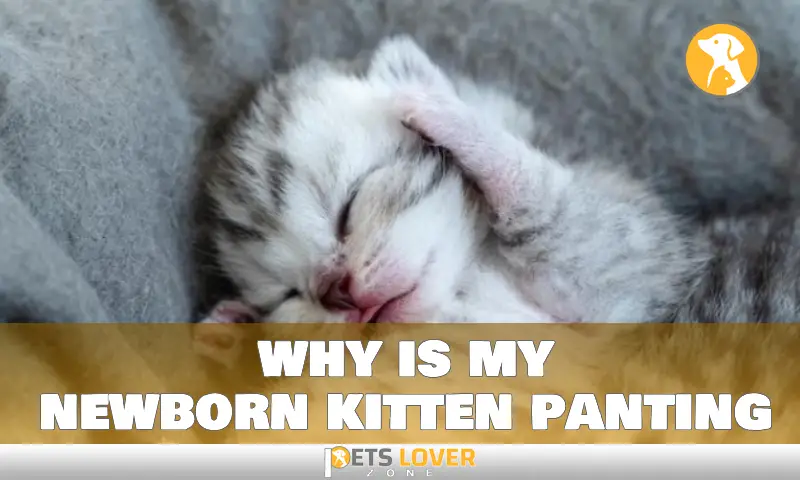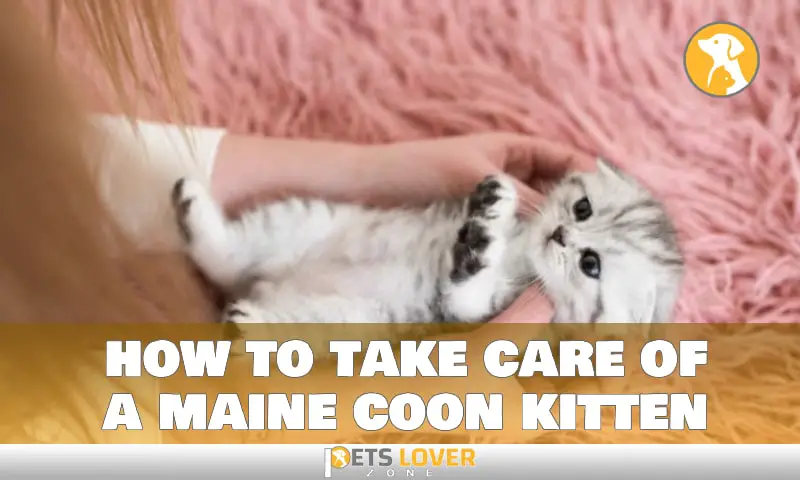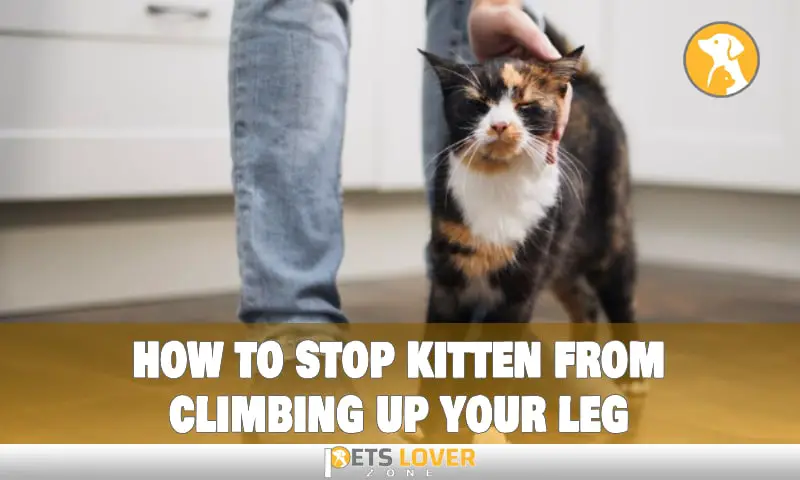Watching a tiny newborn kitten pant can be worrying for new pet owners, but it is important to understand why this is happening and what you can do to help.
Newborn kittens have different needs than adult cats, and panting is a normal part of the development process. The immature respiratory systems or overheating of the kittens, who are still too young to control their own body temperatures, are typically to blame.
In most cases, panting in newborn kittens is not a cause for alarm, but it still needs to be monitored. There are several ways to help reduce panting in your kitten, such as providing them with plenty of cool living space and reducing stress levels in their environment.
This article will explain the reasons behind newborn kitten panting and provide you with tips on how to help keep your tiny fur babies safe and comfortable.
Normal Reasons Why Newborn Kittens Pant
If you hear your newborn kitten panting, it’s natural to be concerned. Although panting is a sign of stress, not all panting has the same cause. Newborn kittens will sometimes pant when they’re too hot or have been over-exercising; this type of panting is completely normal and shouldn’t cause alarm.
Environmental factors, such as temperature, can also cause panting in newborn kittens. If the room is too hot, their bodies may not be able to regulate their own temperature properly, causing them to become overheated and pant as a result.
Likewise, overexertion can lead to panting in newborn kittens. If they’ve been playing or running around too much and their body is unable to keep up with all the activity, they will often start panting as a response. This kind of panting should subside once your kitten has had a chance to rest and recover.
Finally, stress can lead to panting in newborn kittens. If your kitten feels threatened or scared—usually due to loud noises or sudden movements—he may start taking quick breaths as his body attempts to cope with the stress and anxiety.
Dehydration in Newborn Kittens: A Serious Cause of Panting

Newborn kittens are particularly susceptible to dehydration since they have very poor fluid compensatory mechanisms. Therefore, it is essential to be aware of the symptoms that can indicate a kitten is dehydrated and needs help.
Panting is one of the signs of dehydration in kittens and should be taken seriously. Although it may happen, panting brought on by stress or extreme temperatures should not last or have an impact on the kitten’s level of energy. If panting persists, it could be an indication of serious underlying issues, such as a respiratory infection or dehydration.
Other signs of dehydration in kittens include loss of elasticity in their skin (also known as “tenting”), loss of energy, low body temperature, sunken eyes, and a lack of appetite. If your kitten has any combination of these signs, seek medical attention as soon as possible to ensure proper care.
Low Blood Sugar in Newborn Kittens Can Lead to Panting
If your newborn kitten is panting, it may be a sign of low blood sugar, known as hypoglycemia. This is most common in very young kittens who have not yet been weaned and are still nursing from their mother. If your kitten has hypoglycemia, they may exhibit other signs such as lethargy, failure to suckle, depression, mental dullness, stupor, tremors, and seizures.
It’s important to seek veterinary care if you suspect low blood sugar in your kitten. Treatment for hypoglycemia typically includes providing a sugar source, such as sugar water or honey. Helping to restore their blood sugar levels can quickly ease their panting and breathing issues.
Infection or Disease Causing Panting in Newborn Kittens
Panting in newborn kittens can also be a sign of infection or disease, with an upper respiratory infection (URI) being one of the most common causes. URIs are caused by viruses and bacteria, such as the calicivirus and panleukopenia, which can be spread through contact with other cats or shared environments. Kittens frequently contract URIs due to their weakened immune systems, and panting is a common symptom.
Fading Kitten Syndrome, a condition brought on by a lack of nutrition or maternal care and which can quickly result in the death of very young kittens is another potential cause of panting in newborn kittens. In this case, panting may result from dehydration or stress due to their weakened state.
Finally, it’s important to remember that hypocalcemia is a medical emergency in newborn kittens and must be treated immediately in order to prevent serious health consequences and possibly even death. Panting can be one sign of hypocalcemia, along with lethargy, seizures, and difficulty breathing. If your kitten shows any of these signs, contact your veterinarian right away for help.
Environmental Causes of Panting in Newborn Kittens
Newborn kittens rely almost exclusively on their environment and the people around them to provide warmth. Unfortunately, exposure to toxins or extreme temperatures can have a major adverse effect on their fragile health.
Toxins
Exposure to hazardous materials such as air pollution can cause breathing problems in newborn kittens and lead to panting as their bodies struggle for oxygen. Additionally, poor ventilation in some indoor environments can cause an accumulation of pollutants, which can also be extremely dangerous for kittens. Monitor your kitten’s environment and any potential toxins they may be exposed to, such as pesticides or second-hand smoke, and take steps to keep them away from harmful substances.
Temperature
Whether too cold or too hot, extreme temperature fluctuations can be lethal for newborn kittens. The best way to protect them is to provide a consistent temperature of 65–75 degrees Fahrenheit in their vicinity; anything above or below this range has the potential to cause panting (or worse). Invest in a thermometer with a baby monitor app so that you can keep track of the temperature at all times.
How to Help a Panting Newborn Kitten
Panting can indicate a level of distress or difficulty breathing, so helping your newborn kitten will depend on the cause. Your kitten should be examined by a veterinarian as soon as possible if it seems weak or lethargic because it may need assistance nursing.
Fortunately, if the panting is due to dehydration, there are steps you can take to help:
- Provide a warm and comfortable place for your kitten to rest.
- Offer them frequent meals of small portions of high-quality wet food.
- Monitor their weight and their general health.
- Ensure that their water bowl is always full, and give them plenty of fresh water throughout the day.
- Speak with your veterinarian about supplemental options like subcutaneous fluids or syringe feeding to support hydration levels.
It’s important to remember that panting in newborn kittens is not necessarily an indication of something serious, but it’s always best to consult with a vet whenever there are health concerns related to your pet.
Anxiety and Stress Can Trigger Panting Episodes in Newborn Kittens
The anxiety and stress of being a new pet can be overwhelming for cats of any age, but newborn kittens in particular. Studies have found that these tiny creatures may experience fear and panic-like behaviors resulting from environmental changes.
If your kitten is panting due to anxiety or stress, there are steps you can take to help relieve the tension:
- Provide a calm and safe environment – make sure your home is free from loud noises or potential dangers.
- Increase playtime and cuddle time – this will help your kitten feel more secure and loved.
- Talk to your vet – they may be able to provide medication that can reduce your kitten’s anxiety.
It’s important to remember that panting in an otherwise healthy newborn kitten can be a sign of distress or anxiety, so it’s best to identify the root cause and address it quickly in order to prevent any lasting psychological damage.
Respiratory Infections May Cause Panting in Newborn Kittens
If your newborn kitten is panting and you have ruled out any of the more common causes, respiratory infections may be to blame. Kittens, just like any other small animal, are susceptible to a variety of respiratory infections. Cat flu and Bordetella bronchiseptica are two of the most common, but conditions such as Feline Immunodeficiency Virus (FIV), Chlamydophila felis, and Mycoplasma haemofelis can also cause respiratory symptoms in kittens.
If you suspect your newborn kitten is suffering from a respiratory infection, you should contact your veterinarian right away. Your veterinarian will be able to diagnose the illness and determine the best course of treatment for your kitten. Treatment will likely consist of antibiotics, fluids to help with dehydration, and possibly other medications to manage symptoms and prevent complications.
It is important to remember that any type of infection can be very dangerous for newborn kittens, as their young bodies are still developing. It is best to consult with a veterinarian at the first sign of panting, as early diagnosis and treatment can help ensure a speedy recovery for your precious pet.
Low Blood Sugar (Hypoglycemia) in Newborn Kittens
Low blood sugar (hypoglycemia) in newborn kittens can be a serious condition, and understanding why it occurs can help you know how to best take care of your furry friend. Clinical hypoglycemia occurs when the blood glucose is less than 3 mmol/L (50 mg/dL).
The majority of hypoglycemia cases are brought on by poor nutrition. In kittens, this can occur for a variety of reasons, such as:
- Mother does not have enough milk or cannot provide the necessary nutrients.
- A kitten has a genetic predisposition or other medical condition that affects the absorption of nutrients.
- The kitten was born prematurely or too small.
Newborns younger than 10 days lack the shiver reflex and will lose body heat quickly. This can lead to excessive panting and waning energy, as they struggle to keep up with their siblings in terms of energy consumption. If you suspect your kitten has hypoglycemia, then get it seen by a veterinarian right away.
How to Help a Panting Newborn Kitten

If you suspect dehydration is the cause of your newborn kitten’s panting, there are a few things you can do to help.
Hydration
The most important thing to do is provide fluids. Newborn kittens should be given a special milk formula designed for their sensitive digestive systems. Kitten milk replacers can be found in pet stores or online and come in either liquid or powder form. Follow the instructions on the packaging or consult your vet for advice on how much and how often to feed your kitten.
Temperature Control
Panting helps regulate a newborn kitten’s body temperature, so ensure they are in a warm, safe environment. If necessary, use a heating pad or hot water bottle to keep the temperature between 23-30°C (73 – 86°F). Do not use items such as electric heat lamps, as direct contact could lead to burns or other injuries.
Observe
Keep an eye on your kitten over the next few hours and look out for any signs of improvement. If their condition declines or they stop taking fluids, contact your vet immediately, as this could be a sign of an underlying medical issue.
Conclusion
Newborn kittens panting is an indicator that they are in distress. If you come across a kitten painting, it would be best to take it to a vet immediately. There could be several factors causing the panting, like hypothermia, dehydration, respiratory infections, and fever. It is also possible that an underlying medical condition, such as congenital heart defects or respiratory issues, is causing the panting. Ensure that the kitten has a safe and comfortable environment, plenty of warmth, and adequate nutrition. Monitor the kitten closely so that you are able to detect any changes in behavior and seek medical assistance if necessary. With adequate care and attention, the kitten will be able to recover from the panting and live a healthy life.






